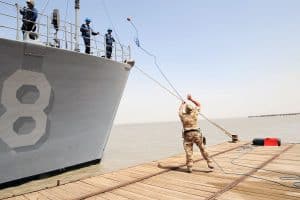Hope is one of those words we tend to use rather flippantly these days. We might say, “I hope I win the lottery,” or “I hope I don’t get a speeding ticket.”
Really what we’re saying is, “I wish I would win the lottery… But I know the odds are so far against it that I don’t really think I will.” We see hope as a feeling or a desire that something might work out.
Most of us bring that understanding of the word hope with us when we read the Bible.
Hope is Eternal
Hope is important.
In fact, it’s so important that it’s one of the three things that the apostle Paul said are eternal.
Three things will last forever—faith, hope, and love—and the greatest of these is love.
— 1 Corinthians 13:13 (NLT)
In Christian circles we hear a lot about faith and love, but hope is rarely, if ever, covered. That’s unfortunate because when the Bible talks about hope it means something very different than what most of us understand.
Biblical Hope
In the New Testament, the Greek word that is translated “hope” is elpis. Here’s the entry for that word from the Enhanced Strong’s Dictionary:
g1680. ἐλπίς elpis; from a primary ἔλπω elpō (to anticipate, usually with pleasure); expectation (abstractly or concretely) or confidence: — faith, hope.
AV (54) – hope 53, faith 1;
I. expectation of evil, fear
II. expectation of good, hope
A. in the Christian sense
1. joyful and confident expectation of eternal salvation
III. on hope, in hope, having hope
A. the author of hope, or he who is its foundation
B. the thing hoped for
In the Bible hope carries with it an expectation that the outcome will actually come to pass. This is far more powerful than a simple wish or desire.
When the Bible talks about hope it is referring to something that is anticipated with pleasure.
As believers we anticipate how wonderful heaven is going to be. Because of what we see in the Bible we expect that God will reward us because we earnestly seek Him.
When we see promises in the Bible we can get excited and truly expect them to come to pass. We read the words of Jesus and the apostles in the New Testament and we linger over them, knowing they are true, anticipating how they are impacting our lives.
There are times when life’s storms rage around us. Like a mariner in a stormy sea at night catching a first glimpse of a lighthouse for a bearing, we can plot a true course based on God’s word. We can expect a good end even when it looks like all is lost because we know from the Bible that God is for us.
Related to Faith
At the beginning we mentioned that there are three things which Paul says are eternal. In that famous verse in Hebrews the first two are directly linked to one antoher.
Now faith is the substance of things hoped for, the evidence of things not seen.
— Hebrews 11:1
Faith is real, tangible. It has “substance.”
Hope is like the precursor to faith. It leads the way, and opens the door to faith. In fact, I don’t think it’s too big a stretch to say faith wouldn’t exist without it.
We can turn to the Old Testament to see what I think is a great word picture of what I’m talking about here.
A Cord
Here’s how Strong’s defines the Hebrew word “tiqwa” that is the most common word translated into the English word hope.
h8615. תִּקְוָה tiqwa; from 6960; literally, a cord (as an attachment (compare 6961)); figuratively, expectancy: — expectation ((- ted)), hope, live, thing that I long for.
AV (34)- hope 23, expectation 7, line 2, the thing that I long for 1, expected 1;
I. cord
II. hope, expectation
A. hope
B. ground of hope
C. things hoped for, outcome
The Old Testament uses a word that also means a “cord.” It’s like a line, connecting us to the things we are in faith for.
A Visual
I saw a great visual of this during my years in the maritime industry working on and around ocean going cargo ships.
Ships are held to the dock with mooring lines, which are basically just big ropes, usually made out of some synthetic material such as nylon, polyester or polypropylene. Typically the biggest of these mooring lines are only about 4″ in diameter. And it’s not unusual for a ship to only have 6 or 8 lines total holding it to the dock.
So you have just a few relatively small ropes holding tens of thousands of tons of steel in place. Our faith is like those mooring lines. It holds us tight to what we believe.
The thing is, even though these lines are relatively small compared to the ship, they are still pretty big to move around. I mean you can’t just throw a 4″ diameter rope over to the dock as your ship is approaching.

The solution is what they call a messenger line, which is also called a heaving line.
A messenger line is a much smaller rope, about like a heavy clothes line, which is tied to the mooring line and then thrown across the gap as a ship is tying up. The messenger line normally has a special large knot in the end of it called a monkey’s fist, to make it easier to throw further.
On board the ship they’ll throw this messenger line across to the line handlers on the dock. The line handlers will then use the messenger line to pull the much heavier mooring line across and then place the end of the mooring line around a bollard on the dock. Then the crew on the ship can winch down the mooring lines and tighten the ship up against the dock securely.
A Picture of Hope
That is how hope works in our lives. It is the initial connection that “bridges the gap” between what is, and what our faith will bring to pass.
When we have an expectant anticipation that something is really going to happen, rather than just a wish or a desire that it will it seeds our faith. It connects us to the thing in the spiritual world, which our faith will then pull across to the natural world.
Because we have the Bible with all the promises of God, we have something outside ourselves that we can truly expect to come about. We can look at those promises, trusting that God is true to His own word, and get excited about actually seeing them come to be in our own lives.
That’s how to truly experience the benefits of Biblical hope.
